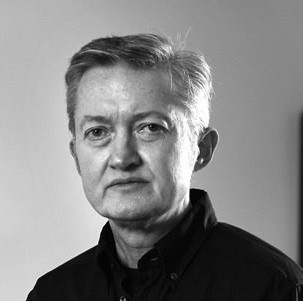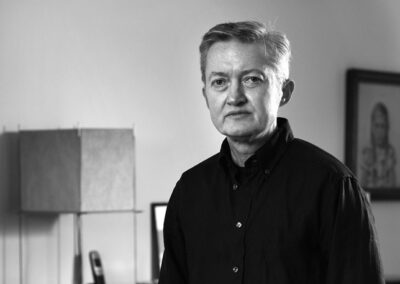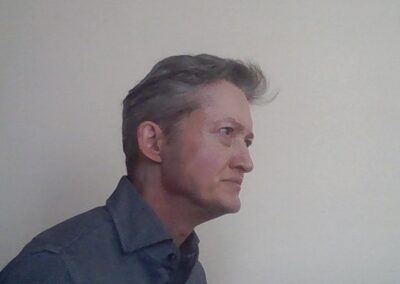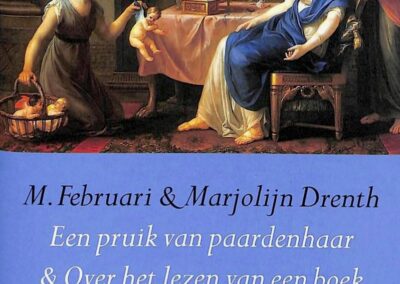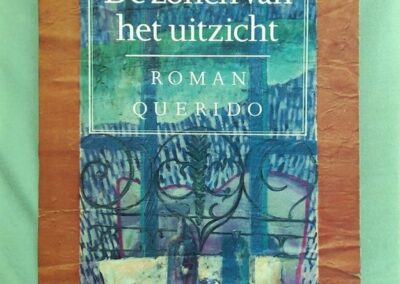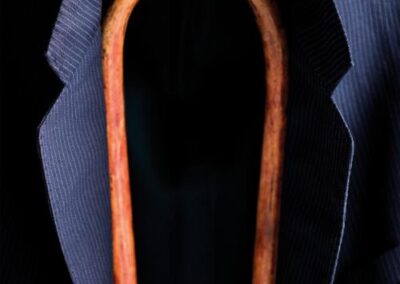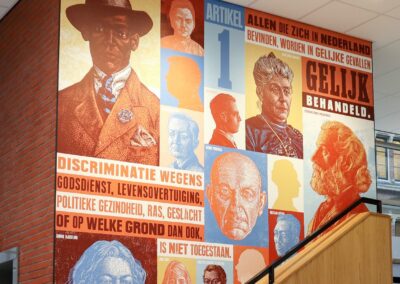Philosopher, writer, and lawyer
Maxim Februari, pseudonym of Maximiliaan (Max) Drenth, is a Dutch philosopher, lawyer, writer, and columnist. When he publicly announced his transition, he received considerable media attention in the Netherlands. His critical stance on identity issues and his refusal to identify with the LGBTQIA+ community make him a remarkable voice in the existing queer debate.
Februari was born on February 23, 1963, in the Dutch city of Coevorden in the east of the Netherlands. He was the second child of parents from the city of Groningen in the north of the country.
His mother was scarred by her father's joining the German troops on the Eastern Front during World War II. As a result, he was imprisoned after the war and his family became stateless. This history weighed on subsequent generations and led Februari to reflect on what good and evil mean on a personal and collective level.
In 1964, the Drenth family moved to Utrecht, where Maxim's father worked as an architectural draftsman for the famous Dutch designer and architect Gerrit Rietveld and studied architecture in the evenings. They lived for a long time in the neighbourhood Overvecht, a city district devoid of beauty, according to Februari, that forced him to seek refuge in the world of art, music, and literature. After primary school (Dalton), he attended the Utrecht grammar school (Stedelijk Gymnasium) (1974-1980).
Maxim Februari now lives with his girlfriend in the Betuwe region and in Germany after having lived for many years in the region called Utrechtse Heuvelrug.
Scientist and author
Maxim Februari began studying philosophy (1985) and art history (1986) at Utrecht University in 1980. He completed a third degree, Dutch law, in 1990.
In 2000, he received his doctorate from the Faculty of Philosophy at the Tilburg University with his dissertation, Een pruik van paardenhaar & Over het lezen van een boek (A Horsehair Wig & On Reading a Book), which was promptly nominated for the prestigious Golden Owl Award. Until 2002, he worked as a lecturer in legal philosophy at Nijmegen University, and subsequently as an independent researcher, columnist, and government advisor on industrial safety.
In 2005-2006, he became a member of the committee "Development of the Dutch Canon." This committee, chaired by medievalist Frits van Oostrom, was commissioned by the Dutch government to develop a canon of Dutch history that would become the standard for national history education.
Februari wrote a large number of works in various genres. Early in his career, he published under the name M. Februari; at the request of his newspaper editor that was changed to Marjolijn Februari to his regret.
He wrote several novels. For his debut novel, De zonen van het Uitzich (The Sons of the View), published in 1989, he received the Multatuli Prize a year later. He also received an award for De literatuur kring (The Book Club) (2007). He received the Annie Romein Award, the national prize for female writers whose work contributes to the development, awareness and emancipation of women, for it, and was shortlisted for the Golden Owl and the Libris Literature Award. His novel, Klont (Lump), was published in 2017. He has also published several essays, most recently Doe zelf normaal (Act normal yourself!) published in 2023.
Februari has received numerous awards for his entire oeuvre: the Frans Kellendonk Award (2008), the J.H. Heldring Award for columns (2018), the Utrecht C.C.S. Crone Award (2019), and the P.C. Hooft Award for essays (2020).
The recommendation of the committee for the 2008 Frans Kellendonk Award summarizes the essence of Februari's work:
Where other writers sometimes settle for expressing their political or moral horror or devoting themselves to aestheticizing their darkly comic quips, Februari remains true to his (editor's note) sense of moral obligation to continue using reason. His (editor's note) work can be seen as a call to study, to research, and to truly understand how the world works.
Over the years, Februari has held board positions at various cultural organizations and for the past 25 years has been a columnist, first for a national newspaper de Volkskrant (1999-2010) and then for another national newspaper NRC Handelsblad (2010-2023, returned in June 2025).
Experiences of Transition
Regarding his youth, Februari said in an interview:
From a very young age, I knew I was a boy. But because I come from a family that had a hard time getting through the war, I didn't want to draw attention to myself. I allowed myself to become a lesbian in my twenties—that was a step in the right direction. But in the decades that followed, it kept nagging at me. I felt increasingly trapped. If I hadn't taken this step, then I probably would have stopped living altogether.
In 2013, the non-fiction book De maakbare man. Notities over transseksualiteit (The Making of a Man: Notes on Transsexuality) was published. When Februari announced in 2012 that he would henceforth be known as Maxim Februari and began a medical transition, the reactions were varied. It led to a flood of commentary, guest appearances on talk shows, and many unwelcome questions. In response to the public's ignorance and curiosity, Februari wrote this book.
In it, he does not only discuss his personal experiences, but also explains what transitioning entails and which questions you should definitely avoid asking a trans person. He also introduces the reader to several trans people from world history. His contribution to making the trans experience, especially from woman to man, a topic of discussion was well received, as were the translations into English, Turkish and Colombian Spanish.
Identity Issues
Since his debut, Februari had built a reputation as a prestigious voice in literature and philosophy. His 1989 debut novel already featured a gender non-conforming character. In a 2007 interview, Februari told Elsbeth Etty about the topic of gender/sex:
They are existing categories, and if you possess both kinds of characteristics, you are never condemned as a person to one or the other. I used to advocate for spiritual hermaphroditism. In my first novel, published under the name M. Februari, the author is constantly being addressed, sometimes female, sometimes male.
Although he protected his private life, it was known that he lived with his partner Gerda Meijerink (1939–2015). For this reason, some praised Februari as a lesbian role model. During this period, he also expressed his discomfort with identifying with the gay community and finding a place in the gay scene. Februari declared himself an author first and foremost, above being labelled gay or straight. He says this in De maakbare man (The Making of a Man):
In the years that followed, the word always cropped up whenever I explained that my romantic love was for women. 'Oh, you're a lesbian!' 'No, I'm not a lesbian, I'm gay.' 'What's the difference then?' 'Being a lesbian is for women.' Of course, no one understood this; I didn't even fully understand it myself, and that was precisely the point. Later, for practical reasons, I resigned myself to the cursed label. Being a lesbian never really suited me, but I was, until I wasn't.
Februari considers "transsexuality" primarily a physical issue. In a 2018 column, he says:
Personally, I consider transsexuality a physical condition. Just as you can be born with a heart defect or a limb defect, you can also be born with the wrong gender characteristics. If you want, you can easily fix that by adding the right hormones. […] Especially when you're finished transitioning, you no longer want to be seen as a patient: in essence, transsexuality is over. That's why, during bursts of precision, I don't call myself a transgender man, but a man with a transition history or a trans background." […] Incidentally, there are also trans people who don't want medical treatment, who don't consider the issue a physical issue, or who permanently identify as 'transgender.
LGBT discomfort
Februari strongly opposes the image in which trans people are constantly referred to as their transness as a defining identity factor. At the same time, he is also committed to trans emancipation where he deems it necessary. In a 2016 interview, he explains why he doesn't want to be approached as a trans man all the time:
I'm dealing with the 'paradox of emancipation.' For example, if I had only talked about transsexuality in the newspaper, I would have acted as if transitioning means you're stuck with it for the rest of your life. I actually want to show that there's not that much to it. (…) The problem is that people only see transsexuals when there's a problem, when something is wrong, when they can no longer find work and therefore don't mind giving interviews." (…) So, you never see all those people who are just doing their fantastic work everywhere in public.
This emancipatory tactic of dealing ‘light-heartedly’ with the topic of transsexuality doesn’t mean that Februari isn’t committed to the trans cause. He supports the Trans Pride march, he has spoken out against the forced sterilization of people who have undergone gender reassignment, and has participated in forums and debates organized by emancipation organizations. But, as he emphasized as a guest on the TV program Zomergasten (Summer Guests) in response to a profile of American concert pianist Sarah Davis Buechner: let’s focus on the capacities and talents of trans people who leave out their transitions. ‘Transsexual,’ he succinctly summarized, ‘is not a career choice.’
In his columns and interviews, Februari protests his involuntary inclusion in the LGBTQIA+ community, primarily because, according to him, there is no such thing as a ‘community’ at all. He regularly objects to the media's and politicians' habit of using 'LGBTQIA+ people' and 'gays' as synonyms and of dismissing “transsexuality” and portraying it as a kind of homosexuality. Firstly, because heterosexual trans people also exist, but primarily because the trans experience is unique and independent of one's sexuality. According to Februari, you isolate people from the rest of society by placing them in a separate community without their consent: it makes them vulnerable to stigmatization and misunderstanding. In a column with which he returned as an NRC columnist in 2025, he wrote:
There is no LGBTQIA+ community. There are people, each of whom needs individual rights to do their work, to make connections, and to live their lives. There is no magical family in which all members have the same interests, the same orientation, the same interests and needs.
Gianna Mula
Vreeburg Cinema, designed by Gerrit Rietveld, Vredenburg Utrecht, in the 1960s
Maxim Februari lived in the apartment above the cinema, 1964-1966.
Cover of '‘Een pruik van paardenhaar & Over het lezen van een boek’ (A Horsehair Wig & On Reading a Book)
Cover of 'De maakbare man. Notities over transseksualiteit.’ (The Making of a Man: Notes on Transsexuality)
Prometheus Books, 2013
Poster about a conversation about gender at the Filbo Book Fair in Bogota, Colombia, 2016
Maxim Februari presented the translation of "The Making of a Man" there. The interview was broadcast on national TV.
Publications (selection)
De Zonen van het Uitzicht (The Sons of the View)(Amsterdam, Querido, 1989)
Een Pruik van Paardenhaar & Over het Lezen van een Boek. Amartya Sen en de Onmogelijkheid van de Paretiaanse Liberaal (A Horsehair Wig & On Reading a Book. Amartya Sen and the Impossibility of the Paretian Liberal) (Amsterdam, Querido, 2000)
Park Welgelegen: Notities over Morele Verwarring (Park Well-situated: Notes on Moral Confusion) (Amsterdam, Querido, 2004)
De Literaire Kring (Amsterdam, Prometheus, 2007), translated in English as The Book Club (London, Quercus, 2010)
Ons Soort Mensen (Our Kind of People) (Amsterdam, Prometheus, 2011)
De Maakbare Man: Notities over Transseksualiteit (Amsterdam, Prometheus, 2013), translated in English as The Making of a Man: Notes on Transsexuality (London, Reaktion Books, 2015)
Klont (Lump) (Amsterdam, Prometheus, 2017)
De Onbetrouwbare Verteller (The Unreliable Narrator) (Amsterdam, Prometheus, 2019)
Doe Zelf Normaal: Menselijk Recht in Tijden van Datasturing en Natuurgeweld (Amsterdam, Prometheus, 2023)
Media
De Wereld Draait Door, BNNVARA, Februari 28, 2013, from min.19.52, https://www.bnnvara.nl/dewerelddraaitdoor/videos/228367
VPRO Zomergasten, Maxim Februari, August 18, 2019, https://www.vpro.nl/programmas/zomergasten/kijk/afleveringen/2019/maxim-februari.html
Aan de man brengen podcast, De Maakbare Man – Maxim Februari, episode 7, July 25, 2020, https://www.youtube.com/watch?v=iZGawqSjUcI
Sources
Bakker, Alex, Transgender in Nederland, Boom, Amsterdam, 2018.
Drewes, Paula J, Maxim Februari. De veelzijdigheid van de mens voorop, BA-eindwerkstuk Nederlands taal & cultuur Universiteit Utrecht, 2016.
Etty, Elsbeth, ‘Het mag in de literatuur wel iets opgewekter’, NRC Handelsblad, 27 juli 2007.
Februari, Maxim, ‘Luchtig doen over transseksualiteit, maar niet te’, NRC Handelsblad, 31 juli 2018.
Februari, Maxim, ‘Verdiep je eens in de mensen voor je je zelfgenoegzame liefdesarmbandje omdoet’, NRC Handelsblad, 22 oktober 2022.
Februari, Maxim, ‘Opgesloten in het lhbt-ghetto’, NRC Handelsblad, 25 juni 2025.
Konst, Dorien en Slob, Marleen, ‘Grensverkeer. Vertrutting of vooruitgang?’, Homologie 17 (1995) 5, 6-9.
Pinedo, Danielle, ‘Maxim Februari over zijn coming out: al heel jong wist ik dat ik een jongen was’, NRC Handelsblad, 17 september 2012.
Pinedo, Danielle, ’Maxim Februari: Het leven is niet goudomrand’, NRC Handelsblad, 2 oktober 2017.
Schers, Sophie, ‘Wat was ik blij met de ‘beste reizigers’ van de NS’, NRC Handelsblad, 16 augustus 2018.
https://www.transgendernetwerk.nl/nieuws/publicatie-in-nrc-omarm-de-vrijheid-van-geslacht/
https://www.cityofliterature.nl/auteur/maxim-februari/
https://continuum.nl/_artikel/maxim_februari_dicht_het_gat
Juryrapport-Maxim Februari C.C.S. Crone Prijs 2019
Maxim Februari 2020 P.C. Hooft-prijs
https://jongejaren.nl/maxim-februari/
Zij aan Zij Encyclopedie, Februari, Maxim
